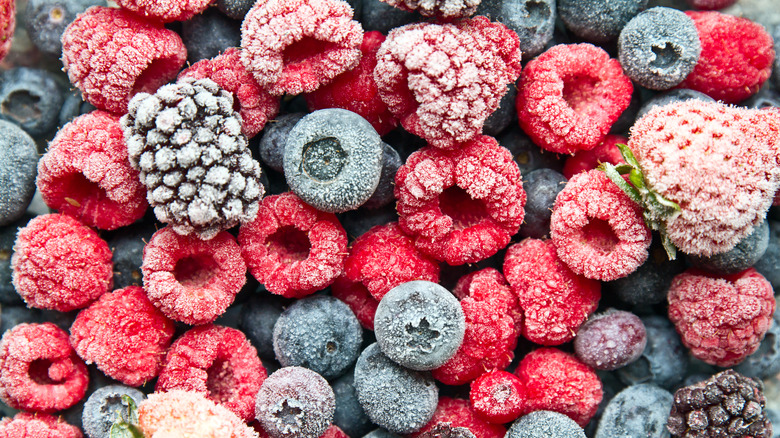Ree Drummond's Favorite Hack For Saving Money On Groceries Is So Simple
Ree Drummond — national treasure, domestic goddess, media mogul, Pioneer Woman, etc. — always has the exact lifestyle tips we need. With a treasure trove of ideas like family-friendly recipes, DIY dinner party decorations, the best way to make toast, and much more, Drummond has long proved herself a reliable source of useful ideas and advice.
One specialty of the Food Network's golden girl is budget-friendly grocery shopping, which is especially useful with the staggering 25% that grocery prices have increased since 2020, far outpacing inflation. Drummond's tips help everyday shoppers gracefully climb the ever-rising mountain that is the cost of groceries without losing wind. Drummond's favorite hack for saving money on groceries is especially straightforward. She advises shoppers to buy frozen produce instead of fresh. Frozen produce tends to be cheaper than fresh and always lasts longer. Unless a recipe specifically warrants raw produce, like a salad, Drummond believes frozen is always the way to go.
The advantages of frozen over fresh
Ree Drummond is a proud advocate for frozen produce. As she told USA Today, "You can save so much money by replacing you know what you might buy in the produce section with frozen and the [difference in] quality is just barely noticeable when you're making a soup or stew or casserole."
The main reason frozen produce tends to be cheaper is that it lasts longer on shelves than fresh produce. Raw fruits and vegetables can spoil soon after they hit the shelves and before shoppers even get a chance to buy them. On average, grocery stores end up throwing away about 30% of their food due to spoilage, a risk that the stores must hedge with their prices. Since frozen produce lasts longer, it is a less risky food category for the grocery stores offering it and, therefore, can be sold at cheaper prices.
A fierce case for frozen produce
Frozen food not only sells at lower prices at most grocery stores but can also help mitigate food waste on the consumers' end. Instead of throwing out stems, peels, rotten bits, and other scraps, frozen food typically comes pre-cut and frozen at peak ripeness, making it as convenient as it is long-lasting.
It may also come as a surprise that frozen fruits and vegetables are just as rich in vitamins and minerals as their fresh counterparts, and sometimes even more so. The freezing process helps preserve the vitamins and minerals that would otherwise die out in raw produce that might sit on the shelf for too long. One study published in the Journal of Agriculture and Food Chemistry found that some frozen fruits and vegetables tended to be higher in vitamins A and C and folic acid. A typical grocery store offers a variety of frozen produce. The options for vegetables and fruits you should buy frozen are extensive, so you will definitely never get bored of your choices.


